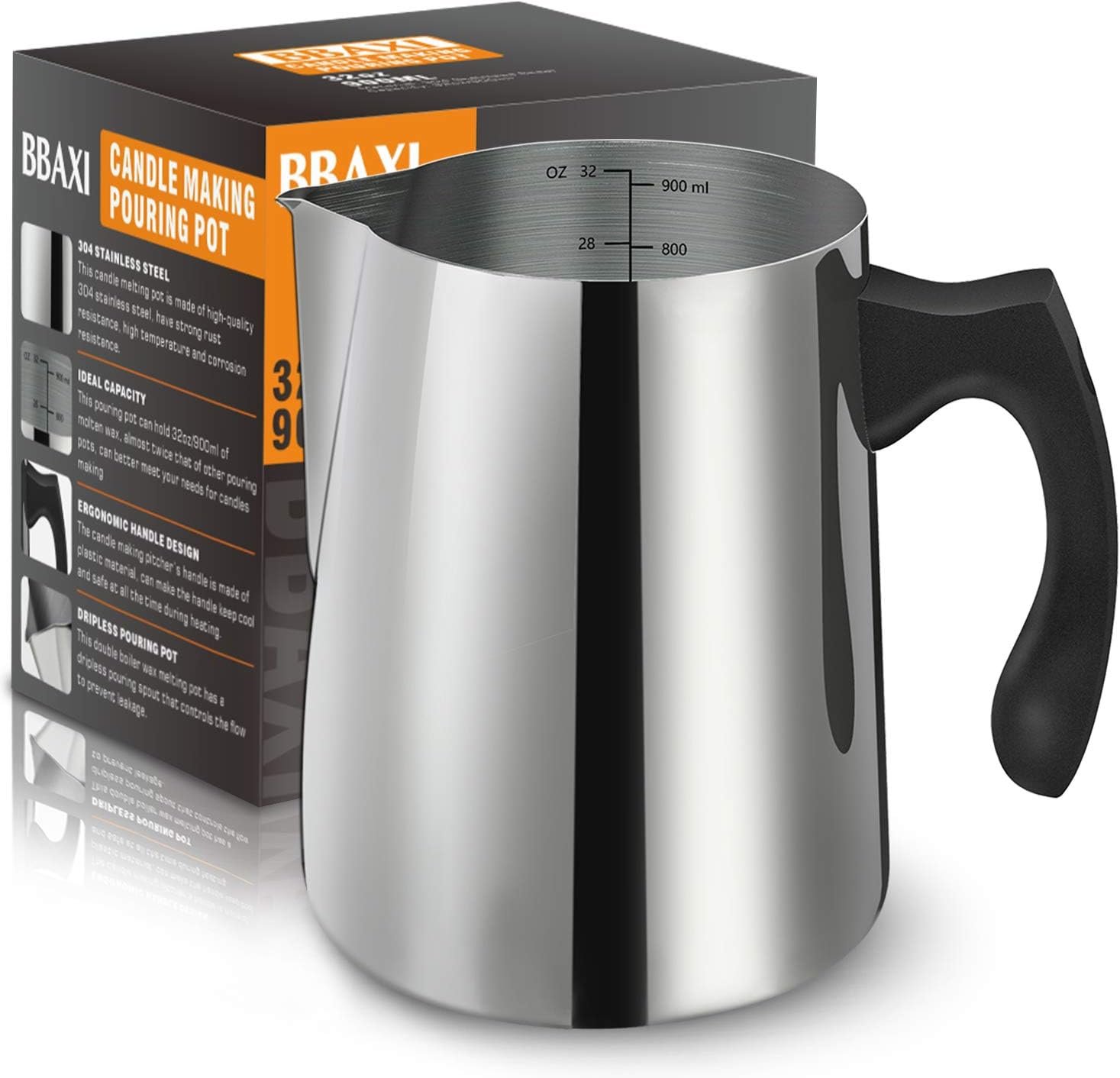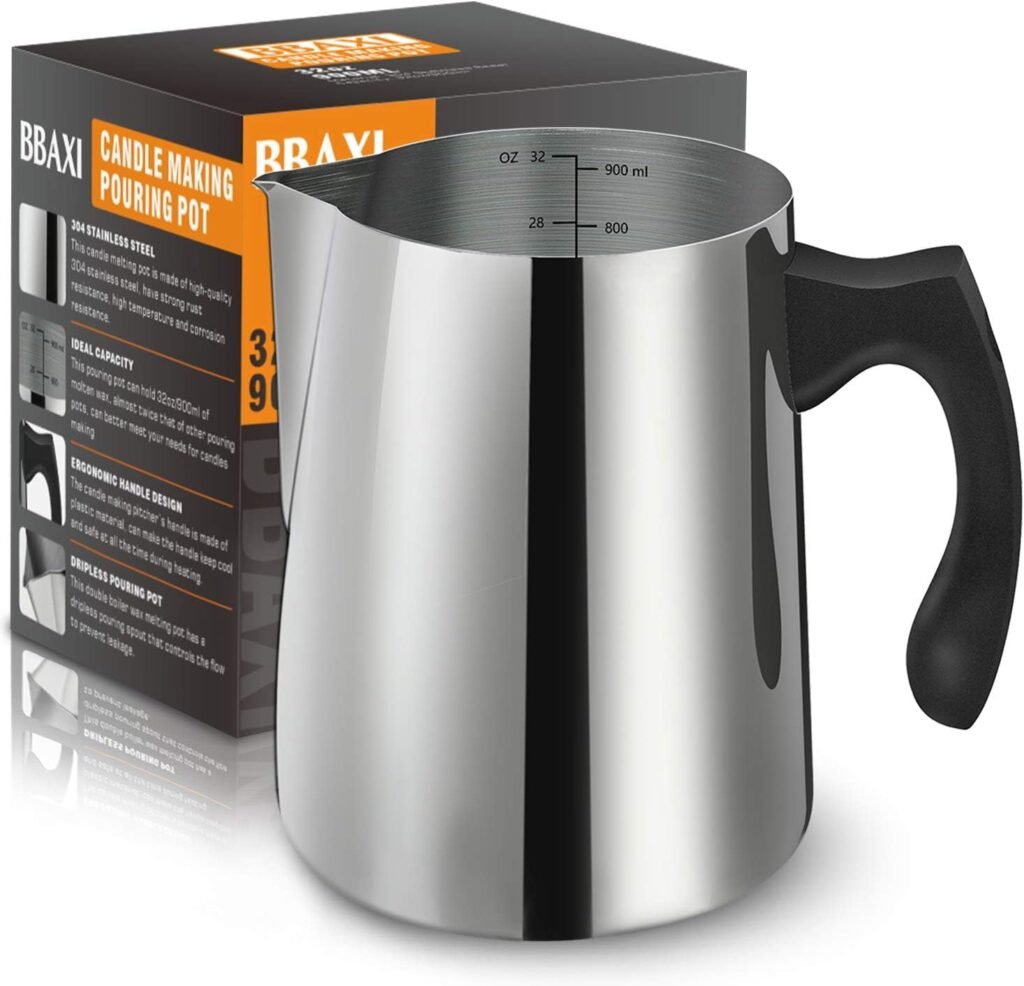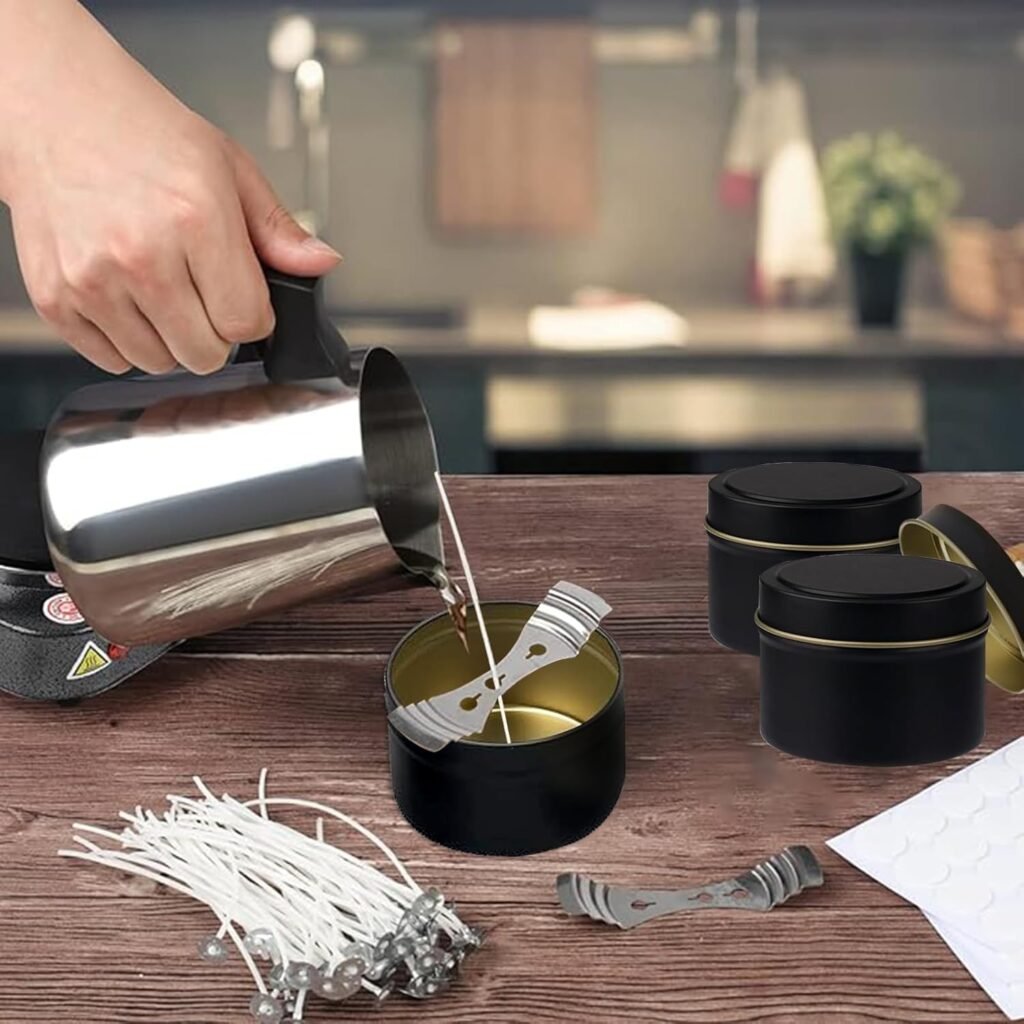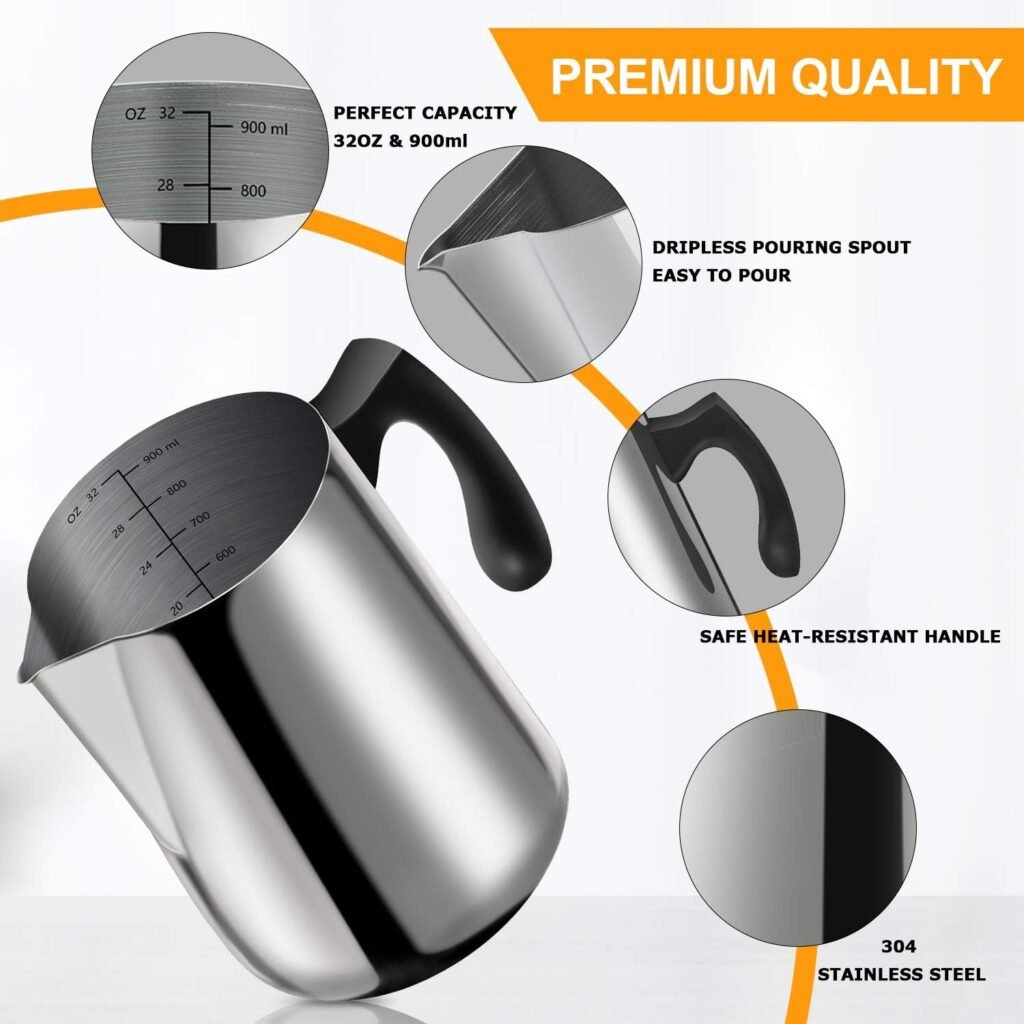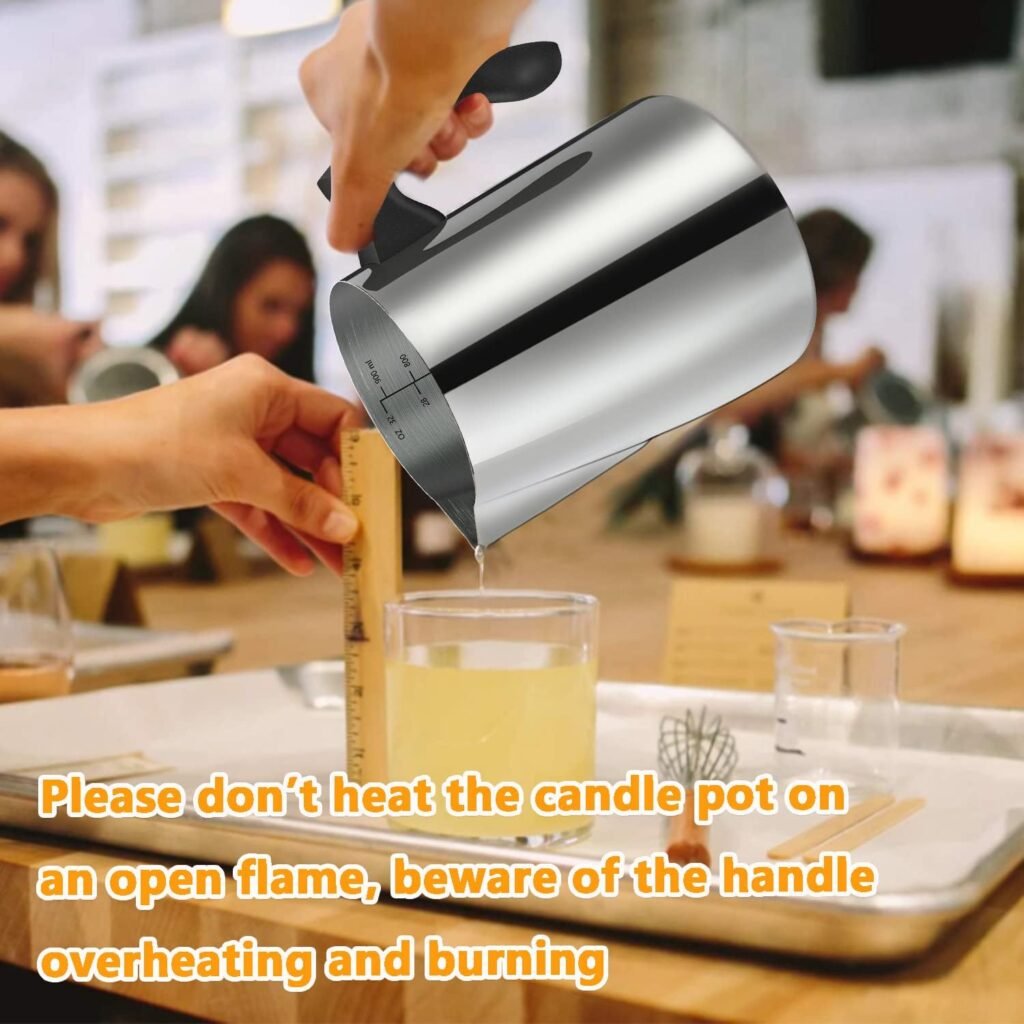Looking for a reliable pouring pot that makes melting and pouring wax for candles easier and cleaner?
Quick Verdict
You’ll find that the Candle Making Pouring Pot, 32oz Double Boiler Wax Melting Pot, 304 Stainless Steel Candle Making Pitcher with Heat-Resistant Handle and Dripless Pouring Spout Design is a solid choice if you want a compact, durable, and user-friendly tool for small-batch candle making. It balances capacity, material quality, and pouring control in a package that’s easy to use and maintain.
Product Overview
This pouring pot is designed specifically for candle makers who work in small to medium batches and want a pot that won’t contaminate wax or leave behind rust. You’ll get a 32oz (900ml) capacity, a dripless spout, and a heat-resistant plastic handle, all built from 304 stainless steel. It’s meant to be used as a double boiler insert rather than on an open flame.
What the product promises
The manufacturer emphasizes a nearly double capacity compared to standard small pouring pots, plus corrosion resistance and a comfortable handle. You can expect cleaner pours and easier cleanup because of stainless construction and the dripless spout design.
Who this is for
If you make candles as a hobby, sell small-batch candles, or gift handmade candles on holidays and special occasions, this pot will likely fit your needs. You’ll appreciate the size if you make multiple small votives or medium-sized jar candles without needing a larger melting setup.
Key Features
There are a few standout features that define this pouring pot: capacity, material, handle, and spout design. Each of these contributes to a smoother melting and pouring process for wax, and you’ll notice practical benefits while you work.
Capacity and dimensions
The pot measures approximately 5.2 inches by 4 inches by 4.2 inches and holds 32oz/900ml of molten wax. That capacity is large enough to handle several small candles or a couple of medium jars in one pour, so you’ll spend less time reheating.
Construction and material
Made from 304 stainless steel, the pot resists rust and corrosion, so you won’t have the metallic odor or contamination that cheaper metals can introduce. It’s also dishwasher-safe in many cases, though hand washing with warm soapy water will preserve finish longer.
Handle and safety
The handle is plastic and designed for heat resistance, so it stays cool during double boiler heating. That gives you safer control while moving and pouring, but remember not to heat the pot on an open flame and to watch for handle overheating if temps get too high.
Dripless pouring spout
A dedicated dripless spout keeps wax from trailing down the pot and creating sticky messes. You’ll get cleaner rims on jars and less waste, which is helpful when you’re aiming for professional-looking candle tops.
Detailed Specifications
You’ll find the technical and physical specifications below so you can compare at a glance and be sure the pot fits your workflow and storage.
| Attribute | Details |
|---|---|
| Product name | Candle Making Pouring Pot, 32oz Double Boiler Wax Melting Pot, 304 Stainless Steel Candle Making Pitcher with Heat-Resistant Handle and Dripless Pouring Spout Design |
| Capacity | 32 oz / 900 ml |
| Dimensions | 5.2 in × 4 in × 4.2 in (approx.) |
| Material | 304 stainless steel (pot) |
| Handle material | Heat-resistant plastic |
| Intended heating | Double boiler method; do not use open flame |
| Spout | Dripless pouring spout design |
| Cleaning | Soap and water; dishwasher-safe depending on manufacturer guidance |
| Use cases | Wax melting for candles, small craft melts |
Performance in Use
You’ll notice how the pot performs in the kitchen or craft room affects both your workflow and final candle quality. This section covers real-world behavior for melting, pouring, and reheating.
Melting efficiency
When you use this pot as the inner vessel of a double boiler, wax melts evenly and doesn’t scorch as quickly as it would in direct heat. You’ll want to stir occasionally to distribute fragrance or dye, and because the stainless steel conducts heat evenly, hotspots are minimized.
Heat-up time
Because the pot is relatively small and stainless steel is a good conductor, it doesn’t take long for wax to reach pouring temperature. You’ll typically see full melt times of around 7–15 minutes depending on the wax type and water bath temperature. Lower melting point waxes will be faster, while soy and beeswax blends will take longer.
Temperature control
You’ll have good temperature control using a separate thermometer and the double boiler method. Since you shouldn’t use this on an open flame, you’ll rely on simmering water beneath the pot to limit maximum temperature and protect fragrance oils.
Pouring consistency
Thanks to the dripless spout, you’ll get steady, controllable pours suitable for filling multiple vessels in quick succession. You’ll avoid common problems like wax trails down jar sides or uneven fills.
Heat Management and Safety
Safety is crucial when you work with hot wax, and this pot includes features that reduce risk while reminding you of safe practices.
Double boiler usage
You should place the pot inside a larger pan partially filled with water. This creates a buffer between direct heat and the wax, preventing scorching and reducing risk of overheating. You’ll avoid hotspots and protect your fragrance from burning off.
Handle precautions
The plastic handle stays cool during normal double boiler use, which makes lifting and pouring easier. You should still use caution: do not place the pot over an open flame, and watch the handle if you raise the water temperature too high or use extended heating sessions.
Fire safety tips
Always keep a fire extinguisher or a lid nearby for emergencies and never leave wax unattended while melting. Wax can ignite if overheated, so you’ll want to monitor temperatures and remove the pot promptly from heat when you’re done.
Pouring Accuracy and Dripless Spout
A big selling point is the spout’s dripless design, which improves your finished candle appearance and reduces cleanup time.
How the spout performs
The spout’s geometry controls flow and cuts off drip at the end of a pour. You’ll notice less wax trailing back down the pot, and jars will stay cleaner. This is especially helpful when filling narrow-neck jars or multiple small votives.
Techniques to maximize dripless behavior
To make the most of the dripless design, pause briefly before pulling the pot away after each pour, then lift straight up. Wiping the tip with a heat-resistant rag after a session will prevent dried wax buildup.
Capacity and Batch Size
Capacity directly affects how many candles you can fill in a session and how frequently you’ll reheat. You’ll want to match pot size to your usual batch to minimize wasted time.
What you can make with 32oz
With 32oz (900ml) of wax you can typically fill:
- Four small tea light-sized pours, or
- Two to three small votive candles, or
- One to two average 8–12 oz jar candles depending on fill height.
That makes this pot great for hobbyists or small-batch sellers who make multiple small or medium candles at a time.
Batch planning tips
Plan your pours so you’re not over-mixing or leaving wax cooling in the pot while you prepare wicks. Keep extra jars prepped and wicks centered before your first pour to speed the process and keep wax at a consistent temperature throughout the session.
Build Quality and Materials
Construction quality affects long-term performance, hygiene, and safety. 304 stainless steel is a good choice for food- and craft-safe melting vessels.
Stainless steel benefits
304 stainless is corrosion resistant, non-reactive, and easy to clean, so you’ll avoid metallic contamination and flavor transfer that might happen with lower-quality metals. You can use it with various wax types and additives without worrying about reaction.
Durability considerations
You can expect years of use from a well-cared-for stainless pot. Avoid hitting it against hard surfaces and store it dry to prevent any surface discoloration. The welds and seams on a quality pot will be smooth so there are no crevices for wax to collect.
Handle Design and Comfort
A comfortable handle reduces fatigue and improves control during pours. This pot’s plastic handle is heat-resistant and ergonomically shaped.
Ergonomics and grip
The handle is molded to fit your hand and stays cooler than metal handles during regular double boiler heating. You’ll feel confident lifting and tilting while pouring because the handle gives a secure grip and good leverage.
Limitations of plastic
Although heat-resistant, plastic handles can soften or warp at extreme temperatures. You’ll need to avoid direct flame and extended high-temp exposure. If you plan to work at high temperatures for long stretches, consider a pot with a metal handle plus protective mitts or a silicone sleeve.
Cleaning and Maintenance
Keeping your pot clean will extend its life and prevent scent or color contamination between different wax types.
Routine cleaning
After wax solidifies, run the pot under warm water and wipe out the interior with a cloth. For residual wax, you can reheat gently in a water bath to liquefy and pour the remainder into disposable containers or a resin-safe container for reuse. Then wash with warm soapy water.
Removing stubborn residue
If wax residues remain, soak the pot in hot soapy water or use a plastic scraper. Avoid abrasive pads that might scratch the stainless finish. If you ever need to remove discoloration, a mixture of baking soda and water can gently lift stains.
Long-term care
Avoid leaving water in contact with the pot for extended periods. Dry thoroughly after cleaning to maintain a bright finish. Store with the lid off or inverted to prevent moisture buildup.
Safety Tips and Best Practices
You’ll want to follow a set of consistent safety practices every time you melt wax. These reduce risk and improve results.
Thermometers and temperature control
Use a reliable thermometer to monitor the wax temperature. Different waxes have different pour temperatures; soy generally pours cooler than paraffin blends. Keep wax below 200°F unless manufacturer specs say otherwise, and aim for the recommended fragrance and dye incorporation temperatures.
Ventilation and workspace
Work in a well-ventilated area and keep children and pets away from the workspace. Fragrance oils can be potent, and spilling hot wax can cause burns.
Handling heated pot
Always use an oven mitt or heat-resistant glove when lifting the pot and be cautious of steam when using a double boiler. Set the pot on a heat-safe surface or trivet to avoid damage to tables or counters.
Troubleshooting Common Issues
You’ll encounter occasional problems, but most have simple fixes.
Wax not melting evenly
Stir slowly and ensure water in the double boiler is simmering, not boiling. Increase water temperature slightly if necessary, but avoid boiling to reduce the chance of water contamination.
Wax dripping despite dripless spout
If wax drips, check for buildup on the spout edge and clean it. Also try adjusting your pour speed and lift technique: pause at the end of the pour and lift upward in a straight motion.
Handle becomes hot
If the handle gets warm, reduce water temperature under the double boiler or limit heating time. Confirm you’re not using direct flame under the pot.
Pros and Cons
You’ll want a clear list of strengths and trade-offs before deciding.
Pros
- Generous 32oz capacity for small-batch candle makers.
- 304 stainless steel resists rust and is easy to clean.
- Dripless spout improves pour quality and reduces mess.
- Heat-resistant plastic handle stays cooler for safer handling.
- Compact size makes storage and handling easy.
Cons
- Not intended for open flame; you’ll always need a double boiler setup.
- Plastic handle can still warm with extended high heat.
- 32oz may be small for large-scale makers who want to pour many large jars at once.
Comparing with Alternatives
You’ll find other pouring pots with different sizes, materials, and features. Here’s how this pot stacks up.
Larger capacity pots
If you make large batches or many jar candles, larger capacity pots (e.g., 1–2 liters) reduce the frequency of reheats. However, they take longer to melt and are bulkier to store.
Glass or aluminum pots
Glass pots let you see wax color and clarity but can be fragile and slower to conduct heat. Aluminum heats faster but can react with additives and corrode over time. Stainless offers a good middle ground for durability and reactivity.
Electric melters
Electric wax melters simplify temperature control and eliminate the need for a double boiler, but they’re more expensive and less versatile for stovetop tasks. If you want an all-in-one solution with consistent temp control, an electric melter might be worth the investment.
Use Cases and Project Ideas
You’ll want ideas for how to use the pot beyond basic candle pours. Here are practical project suggestions to expand your craft.
Holiday and seasonal candles
Make themed bundles for holidays: small votives with colored layers or embedded botanicals (if safe with wax). The 32oz capacity helps you do several small pours for sets.
Sample and tester candles
Use the pot to create test burns for fragrance and wick testing. You’ll be able to pour multiple test jars without committing to large batches.
Recycled wax and color mixing
If you collect leftover wax bits, the pot is great for melting and remixing into mosaic or layered candles. You can also experiment with dye concentration and fragrance blending in manageable amounts.
Pricing and Value
You’ll compare price against durability and features. For hobbyists or small sellers, this pot often represents good value because of the stainless steel build and practical design.
Is it worth the cost?
If you want a reliable small melter that’s easy to clean and gives professional pours, this pot is a solid investment. You’ll save time and reduce mess compared to makeshift solutions like improvised tins or bowls.
Final Thoughts
You’ll find the Candle Making Pouring Pot, 32oz Double Boiler Wax Melting Pot, 304 Stainless Steel Candle Making Pitcher with Heat-Resistant Handle and Dripless Pouring Spout Design to be a well-balanced tool for hobby and small-batch candle making. It offers the right combination of capacity, materials, and user-focused design features like the dripless spout and cool-touch handle. If you follow safe practices—using a double boiler, monitoring temperatures, and avoiding open flame—you’ll have a dependable pot that helps your finished candles look cleaner and more professional.
If you want, I can summarize optimal melt and pour temperature ranges for common wax types, or help you plan a step-by-step pour routine for a particular jar size so your first session with this pot goes smoothly.
Disclosure: As an Amazon Associate, I earn from qualifying purchases.
